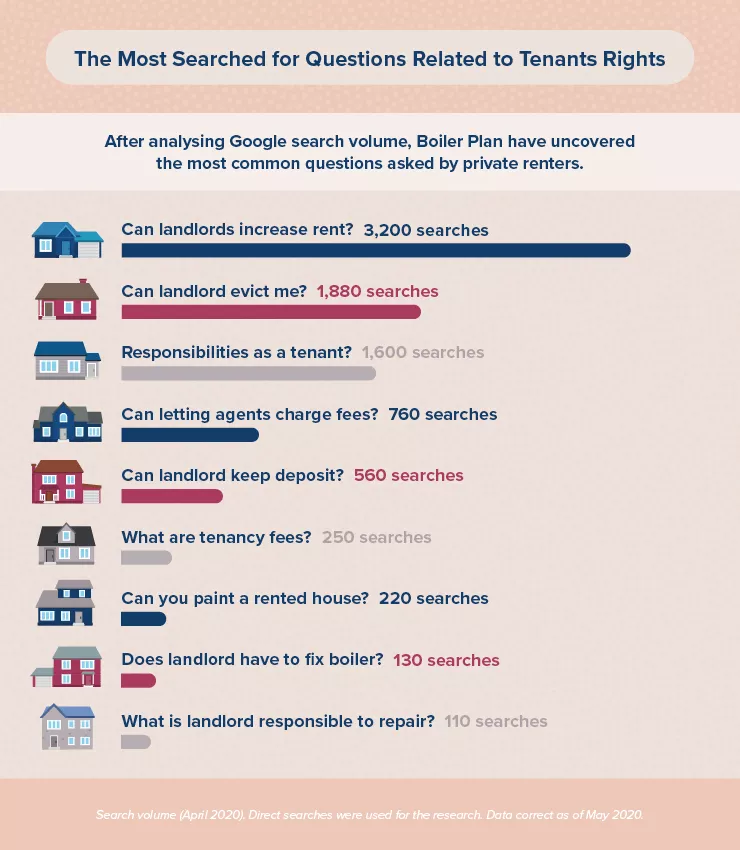We answer those burning most common questions for private renters, quickly jump to the answer here:
Can Landlords Increase the rent?
Can my Landlord evict me?
What are the responsibilities of a tenant?
Are letting agencies allowed to charge fees?
Can my landlord keep my deposit?
Can I paint my rented house?
Is my landlord responsible for heating repairs?
What is my landlord responsible to repair?
Boiler Plan discovered that, in the current climate, searches for ‘tenants rights’ have increased by 15% – suggesting Brits are still in the dark about their rental rights. This is becoming ever more present as renters are currently dealing with the effects of COVID-19, and what could happen to the rental and housing market.
Today, 4.5 million of all UK households are private renters. But, with more people than ever renting, do Brits actually know their tenant’s rights regarding their home repairs, maintenance and more?
In an effort to provide advice and ensure landlords are able to improve their properties to comply with recent legislation, and that tenants are aware of their rights, Boiler Plan has uncovered the most common questions from private renters and answered their queries.
The most common questions for private renters

As you can see from the above, Brits are mostly concerned with rental increases and the possibility of eviction. Sadly, searches for ‘can my landlord evict me’ have increased by a staggering 52% between February and April 2020.
Answered: The 9 most common private renting questions
With that in mind, Boiler Plan has pulled together information on some of the rights you may not be aware of as a private tenant – such as maintenance and repair, and even who is responsible for the boiler.
Can landlords increase the rent?
If you are, currently, in a fixed-term contract, your landlord or letting agent cannot increase rent whenever they like and must follow certain rules. This is unless you agree to it or you have a clause in your tenancy agreement that allows it. However, you can find more information on negotiating with your landlord at Citizens Advice.
Can a landlord evict me?
As a private tenant, there are strict procedures your landlord must follow if they are looking to evict you. However, this is dependent on the tenancy agreement you have, and you can seek more reassurance and further answers on the Gov website.
What are my responsibilities as a tenant?
First and foremost, you should understand your responsibilities as a tenant. Staggeringly, however, this is the third most searched-for question, suggesting that renters could be risking their homes by not understanding the guidelines.
The main responsibilities to follow are:
- Pay your rent on time or speak to your landlord/letting agent if you have financial struggles.
- Look after the home. This involves reporting any repairs to the landlord, ensuring the home is well-ventilated and regularly checking smoke alarms.
- Allow your landlord access to any repairs. However, they must provide 24 hours’ notice and not just turn up, with the repairs set for a reasonable time during the day.
- Report any repairs immediately and do not fix them before speaking to your landlord/letting agent to ensure you are not liable for the cost.
- Allow annual gas safety checks. The landlord must regularly service the boiler to identify any faults that could cause serious issues.
- Live in your home. You could lose your tenancy if you choose to sublet your property.
Can letting agents charge fees? / What are tenancy fees?
The ban on tenant fees came into force on 1 June 2019, applying to new or renewed tenancy agreements from that date. The legislation aims to reduce the costs that tenants face at the outset. More information on what fees they can charge can be found on the Gov website.
Can landlords keep the deposit?
A deposit is, essentially, insurance against something going wrong in the property. Your landlord is within reason to keep the deposit if they have suffered financial loss from the below:
- The rental property has been damaged.
- The rent hasn’t been paid.
- Items are missing from the home that was part of your tenancy agreement.
- The property needs to be cleaned.
- You left before the end of your tenancy agreement.
However, it’s important that your deposit is protected and, if it hasn’t been within 30 days, you could receive up to three times the amount. You can seek help from Citizens Advice and more if you believe they are holding your deposit unjustly.
Can you paint a rented house?
Brits are embracing DIY more than ever. So, it’s little surprise that ‘can you paint a rented house’ has seen a 36% increase in searches between March and April 2020 and is the 8th most-searched-for rental question in the UK
You certainly can paint your rented property, but you will need to ask the letting agent or landlord first. The landlord should be redecorating and touching up the paint every three years. So, if you intend to be there for that amount, suggest you could do the painting for them if they purchased the equipment needed – saving them time and hassle. However, you may need to repaint when you leave, so we suggest erring on the side of caution when it comes to dark colours.
Does the landlord have to fix the boiler?
Surprisingly, this is a very common question for renters with over 130 searches per month. Landlords absolutely have a responsibility to repair the boiler if the tenant hasn’t purposely damaged it. It’s important that you have complete access to heating and hot water.
The minimum heating standard is 18 degrees for the living room and 21 for the bedroom. In the colder months, you shouldn’t be left without heating for 24 hours. If this extends past two days, it is considered a health hazard and a serious breach of the tenancy agreement. You must provide a clear and written explanation of any heating/hot water issues via text or email to ensure your message is recorded.
It’s also required by law that landlords install at least one smoke alarm on each storey of their property. They must also fit a carbon monoxide alarm in any room containing a solid fuel-burning appliance, such as a coal fire. This could result in a £5,000 penalty if not followed.
Landlords are also not able to rent a property unless it has an energy-efficient rating of at least E on its Energy Performance Certificate. This new legislation applies to existing tenants, not just new renters and can result in a civil penalty of £4,000. – You can read more about the new EPC law for landlords here
For any landlords/tenants wondering if it is still possible to carry out urgent boiler repairs during the pandemic, it is absolutely. Our engineers are doing everything they can to ensure you are not without heat or hot water and are practising social distancing guidelines as well as carrying out risk assessments.
What is the landlord responsible to repair?
If you are wondering what repairs the landlord is responsible for, however, it is generally the structure and exterior of your home. This would include the roof and walls, for instance. They should also maintain the pipework, toilets, water, boilers, wiring, radiators, fitted fires and other heaters.
Private tenants in Bristol are most unsure of their rental rights

While it seems many Brits are unsure of their responsibilities in their rented property, it’s residents in Bristol that are searching the most for ‘tenants’ rights’. This could be attributed to a recent report that the city has seen a huge rise in the number of older people renting who may not be aware of their rights.
Similarly, the cost of renting is reportedly rising faster in Northern Ireland than it is anywhere else in the UK, which could be behind Belfast’s high searches for ‘tenants’ rights’.
Swansea residents have the most confidence in their tenant rights, with the least searches for the term coming from the city. In the past year, the city has seen a huge demand for rental properties, which could explain why they are more aware of their rental rights.
Jay Lee, who runs an academy providing Mortgage Advisor courses, said: “As the tenant, you should know what you can and cannot do in the property. You should know the guidelines to ensure the property meets the regulations set by the government and, more importantly, that the property is safe to live in. It’s also essential to read your obligations as a tenant, as this will provide details if you’re responsible for certain repairs, maintenance or if the landlord is etc. This will also make sure you don’t have any unexpected surprises in the future.”
Even if you are aware of some of the information mentioned above, it’s important that before you move into a rented property, you read up on your rights.

